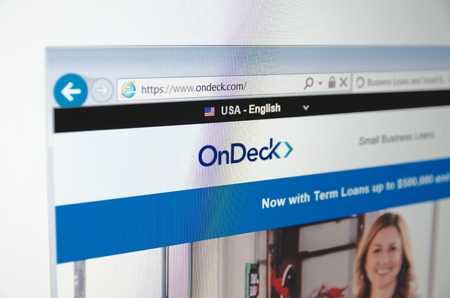Archive for 2019
Lending Express Rebrands to Become
July 16, 2019 Lending Express, a company whose CEO was once a master gamer, has rebranded to Become.
Lending Express, a company whose CEO was once a master gamer, has rebranded to Become.
“This transition comes at a pivotal point in the company’s growth and highlights its dedication to providing businesses with opportunities to improve fundability, secure funding, and ultimately become more,” a company spokesperson wrote.
According to the company, their online loan marketplace grew from just one lending partner in Australia to over 50 lending partners, operating in both Australia and the US. They’ve facilitated more than $150 million in funding and have over 150K members on their platform to date. Their journey is documented on a blog post published this week.
Star Fundraiser For 1 Global Capital Settles With The SEC
July 15, 2019 Henry J. “Trae” Wieniewitz, III was charged by the SEC on Monday for his role in allegedly selling unregistered securities in two companies, 1 Global Capital (the now defunct merchant cash advance provider) and Woodbridge Group of Companies (a purported real estate lending business revealed to be a $1.2 billion ponzi scheme).
Henry J. “Trae” Wieniewitz, III was charged by the SEC on Monday for his role in allegedly selling unregistered securities in two companies, 1 Global Capital (the now defunct merchant cash advance provider) and Woodbridge Group of Companies (a purported real estate lending business revealed to be a $1.2 billion ponzi scheme).
“Wieniewitz and Wieniewitz Financial raised more than $11.4 million and reaped approximately $500,000 in commissions from unlawful sales of Woodbridge securities, and raised more than $53 million and obtained approximately $3 million in commissions from unlawful sales of 1 Global securities,” the SEC stated.
Wieniewitz was not a registered broker-dealer nor associated with a registered broker-dealer.
A settlement was announced simultaneously. “Wieniewitz and Wieniewitz Financial settled the SEC’s charges as to liability without admitting or denying the allegations, and agreed to be subject to injunctions, with the court to determine the amounts of disgorgement, interest, and penalties at a later date,” an SEC statement said.
Wieniewitz was not alone in selling investments in both 1 Global and Woodbridge.
Separately, the owner of Woodbridge and two former directors of the company were recently charged criminally.
No criminal charges have been brought to date in the 1 Global Capital saga. That could change. 1 Global Capital revealed in 2018 that it was being investigated by the US Attorney’s office. That along with the SEC investigation prompted the company to file for bankruptcy. The SEC subsequently brought civil charges.
Documents filed in the SEC case against 1 Global’s former owner, Carl Ruderman, have since revealed that at least one former employee had been approached by the FBI about the operations of 1 Global.
Last month, it appeared Ruderman and the SEC were heading towards a settlement.
One notable fact about 1 Global Capital is that the company participated in the largest merchant cash advance in history at $40 million. That transaction has become a point of significant controversy and litigation. The recipient of those funds, a conglomerate of car dealerships in California, have shut their doors.
Apple’s Credit Card Looms Despite No Clear Launch Date
July 14, 2019 “A new kind of credit card. Created by Apple, not a bank.”
“A new kind of credit card. Created by Apple, not a bank.”
Now plastered across Apple’s website, these words signal the company’s next advancement into finance with Apple Card, the new credit card service it is launching later this summer. And they’re only half true.
While it is a novel take on credit cards, it’s not entirely free of banking’s influence, as Goldman Sachs has partnered with Apple for it. According to Margaret Keane, CEO of Synchrony Financial, the largest provider of store credit cards, there “were a lot of us” bidding for the partnership with Apple, “us” being banks and card providers, but Goldman came out on top.
The spoils of war being won in this case are a 2023 earnings-per-share gain of 2% by 2023 for Goldman, as well as the responsibility of managing all card payment disputes. The latter of which being an anomaly amongst Apple services, as the company has a history of overseeing all aspects of the customer experience.
What Apple stands to gain in comparison is a 1% gain by 2023. Being below the industry average, neither of these forecasts are something to be excited about. But these figures aren’t surprising, with the card offering no fees and low interest rates it appears as if Apple Card will be launched with the hope of staking some of the market share rather than seeing profits soar.
Offering financial statements and analysis via an app, as well as being available in two forms, a digital card in Apple Wallet and a titanium card that features no numbers on it, front or back, Apple Card bares a striking similarity to the recent trend of app-based banking witnessed in Europe, with the likes of N26 and Revolut booming in popularity in previous years.
Where Apple differs from these companies is that it specializes in credit, thus it offers a range of features unique to both the format and their position as a near-omnipresent tech giant. Auto-fill integration with Safari; cash back on each purchase made with Apple Card, being 3% on any Apple products purchased, 2% on non-Apple purchases, and 1% when using your Apple Card at a vendor who doesn’t accept Apple Pay; an APR range of 13.24-24.24; and options for when you’d prefer to pay your interest, complete with clear payment schedules, are all being promised. As well as this, Apple is hoping to combat the common inconvenience of cryptic merchant names that pop up in statements. Jennifer Bailey, Vice President of Apple Pay, explained that “With Apple Card we use machine learning and Apple Maps to transform this mess into names and locations that you’ll recognize.”
All of this was outlined back in March, when Tim Cook took to the stage in Cupertino, California to claim that Apple is making the “most significant change” to credit cards in five decades. But months have passed since this assertion, and as the vague release date of “summer” offers no specificity to Apple fans who are holding their breath, those who are curious about Apple Card are left to be satisfied by the infrequent reviews that slip out from Apple employees who are enrolled in the program’s beta.
We’ll find out if the wait will be worth it sometime soon, probably, but until then there’s always the 1986 Apple credit card that can be ogled at until Apple Card is released to the public.
Online Lenders Beat Credit Unions, Friends, and Family as Primary Source of Credit
July 14, 20197% of small businesses generating less than $5 million/year in revenue relied on online lenders as their primary source of credit in the last quarter, according to the latest Private Capital Access Index published by Pepperdine Graziado Business School. 3% relied on credit unions as their primary source and 6% relied on friends and family.
Banks were the most popular. 19% relied on large banks as their primary source of credit and 12% relied on community banks.
38% said they didn’t have any source of credit at all.
Sticking with the under $5 million/year segment, 45% of respondents explained that their primary source of credit had become so simply because they were able to qualify for it. 21% said their primary source became so because they couldn’t qualify for any other source.
Meanwhile, merchant cash advances, online business loans, and factors experienced among the lowest reported approval rates for businesses of all sizes. Of those businesses that applied for financing, the success rate in obtaining funds are as follows:
| Financing Type | Success Rate |
| Business credit card | 65% |
| Trade credit | 57% |
| Personal loan | 51% |
| Lease | 48% |
| Bank loan | 41% |
| Online lender | 38% |
| Merchant cash advance | 31% |
| Asset Based Lender | 28% |
| Factor | 23% |
| CDFI/Credit Union | 18% |
While bank loans came in at 41%, revenue was a major determining factor. 88.9% of businesses doing $5 million to $100 million/year in revenue successfully obtained a bank loan while only 31.6% of businesses doing less than $5 million/year in revenue successfully obtained a bank loan.
Trump Attacks Bitcoin and Cryptocurrencies
July 11, 2019
President Trump revealed his stance on cryptocurrencies over twitter on Thursday, and he’s no advocate.
“I am not a fan of Bitcoin and other Cryptocurrencies, which are not money, and whose value is highly volatile and based on thin air. Unregulated Crypto Assets can facilitate unlawful behavior, including drug trade and other illegal activity. Similarly, Facebook Libra’s “virtual currency” will have little standing or dependability. If Facebook and other companies want to become a bank, they must seek a new Banking Charter and become subject to all Banking Regulations, just like other Banks, both National and International. We have only one real currency in the USA, and it is stronger than ever, both dependable and reliable. It is by far the most dominant currency anywhere in the World, and it will always stay that way. It is called the United States Dollar!”
I am not a fan of Bitcoin and other Cryptocurrencies, which are not money, and whose value is highly volatile and based on thin air. Unregulated Crypto Assets can facilitate unlawful behavior, including drug trade and other illegal activity….
— Donald J. Trump (@realDonaldTrump) July 12, 2019
….Similarly, Facebook Libra’s “virtual currency” will have little standing or dependability. If Facebook and other companies want to become a bank, they must seek a new Banking Charter and become subject to all Banking Regulations, just like other Banks, both National…
— Donald J. Trump (@realDonaldTrump) July 12, 2019
…and International. We have only one real currency in the USA, and it is stronger than ever, both dependable and reliable. It is by far the most dominant currency anywhere in the World, and it will always stay that way. It is called the United States Dollar!
— Donald J. Trump (@realDonaldTrump) July 12, 2019
OnDeck Canada, Credit Union Announce Partnership
July 11, 2019 Today sees the partnership of OnDeck Canada and Coast Capital Savings, the first collaboration of its kind in Canada, being between an online lending company and a federal credit union.
Today sees the partnership of OnDeck Canada and Coast Capital Savings, the first collaboration of its kind in Canada, being between an online lending company and a federal credit union.
Beginning this month, small business members of Coast Capital will be able to apply for term loan financing from OnDeck Canada of up to CAD$250,000 online, in branch, and via the Coast Capital Contact Centre. And as a perk of partnering with an alternative financing company, Coast Capital members will benefit from the fast turnaround times for approvals and funds being made available that are typical of the industry, with waits being as short as one day.
The move comes as OnDeck Canada is expanding to Quebec, paralleling Coast Capital’s efforts to spread across the nation, beyond its home of British Colombia. Both parties appear to be approaching the partnership with similar visions of where it will take them, with Tiffany Kayar, the OnDeck Canada Communications Manager, explaining that OnDeck is able to further help fund those small businesses who have been historically underserved by alternative financing, and Coast Capital will benefit from a greater national presence.
It is one more notch on OnDeck’s belt of partnerships, coming after the online lender linked with JPMorgan Chase in 2017 and PNC Financial Services Group last year to extend loans to businesses.
And for Coast Capital, which has the largest membership base of any credit union in Canada, it is a development that is consistent with their history of innovation. Having offered Canada’s first free checking account from a full-service financial institution and Help Extras®, which further assist members with investing, this opening up of funding channels to small business owners further cements Coast Capital’s position as a unique non-bank choice for finance management.
With small businesses comprising 98% of Canadian businesses, this partnership is hoping to provide support for such a large sector of the country’s economy. Saying in a press release that “As the proven leader in online small business lending, OnDeck Canada is delighted to partner with Coast Capital to offer online financing to its small business customers, ensuring that their unique and ever-evolving needs are met faster than ever with the power of automation and a world class digitized customer experience,” Neil Wechsler, CEO of OnDeck Canada, is confident that the synergy between OnDeck’s tech and Coast Capital’s membership will benefit the Canadian business community. Just as Derek Turner, Head of Small Business at Coast Capital, is sure that the partnership will “deliver the Coast Capital experience that so many members already enjoy, to even more people across Canada.”
“You’re Not an Entrepreneur Until…”: How IOU Financial Worked its Way Out of ’08
July 9, 2019“It makes you feel old, but I don’t feel that old,” is how Robert Gloer, President and COO of IOU Financial, describes what it’s like to have been in finance since the early nineties. With his career predating social media and the explosion of tech in the workplace that has marked the previous two decades, Gloer could be presumed to be behind the times with regards to digital resources, but the practices of IOU indicate otherwise.
Born from a chance meeting between Gloer and his business partner, Philippe Marleau, at Finovate in 2008, the two men combined their businesses to form IOU, Marleau bringing the tech support and Gloer providing the operations team. Beginning this venture together just before the economic collapse of ’08, the early days of IOU were rough, and it took them a year of operating before even making their first loan.
Saying that “you’re not a true entrepreneur until you’ve put payroll on your equity line,” Gloer now laughs about those first few years. And what’s not to laugh at? With offices in Atlanta and their headquarters in Montreal, IOU is operating in two markets with a staff of 50 employees and has funded $700 million since its founding, averaging just over $15 million a month via small business loans. And they’ve even gone public, claiming a place on the Canadian stock exchange – sans a flashy IPO announcement party.
Those initial years of graft seem to have paid off, and Gloer assures me that throughout their time operating, he and Marleau, the CEO and director of IOU, have stuck to those initial visions and core values they set out to practice upon founding the company: to provide secure loans to good quality debtors with the aid of technology.
In fact, it is the last aspect of this goal that Gloer is keen emphasize. The incorporation of technology in their lending process is the reason why the COO believes IOU competes at such a high level in the industry for a company of its size. Their B.E.S.T. system is an example of this, as it offers direct access to the small business loans world for every player in the ecosystem. Banks, business, suppliers, credit card and payment processors, and more can sign up to B.E.S.T. and shop around to see which party they’d like to deal with.
 Built with the ethos of quality over quantity, IOU charges a relatively low entry fee for B.E.S.T., as Gloer asserts that he’d “rather make $1 from one million people, than $1 million from one person.”
Built with the ethos of quality over quantity, IOU charges a relatively low entry fee for B.E.S.T., as Gloer asserts that he’d “rather make $1 from one million people, than $1 million from one person.”
Comparing his company’s adoption of technology to the infamous story of how Blockbuster CEO John Antioco turned down an offer to buy Netflix in 2000, Gloer claims that the key to long-term success is a company culture that both looks to the future to see incoming trends and incorporates a willingness to change and adapt new developments within the field.
And it is just that which IOU is doing in Canada. Explaining that the alternative finance scene there is still in its “infancy,” Gloer is anticipating what’s to come as an opportunity to implement the lessons learnt in the American market before the mistakes that yielded them are made. Listing COJs specifically as an example of something so muddled that he’d like avoid them north of the border, Gloer believes Canada offers a chance to build an industry cleanly, without as many of the growing pains he’s contended with throughout his decades-long career.
And with business going well, as well as IOU’s recent entry into a $50 million credit facility with Credit Suisse, it looks like Gloer’s, as well as his company’s, time in alternative financing is set to continue.
Robert Gloer is also speaking on a risk management panel at deBanked CONNECT Toronto on July 25th alongside Merchant Growth CEO and President David Gens.
New York Attorney General Turns Up The Heat On Tether, Bitfinex
July 9, 2019 Bitcoin is back over $12,500 but a growing chorus within the crypto faithful are pointing to a potential catastrophic event that could change the crypto markets forever.
Bitcoin is back over $12,500 but a growing chorus within the crypto faithful are pointing to a potential catastrophic event that could change the crypto markets forever.
It’s the potential implosion of Tether, a company spotlighted in a recent deBanked magazine story for its uncanny ability to create digital dollars out of thin air, and a new forceful response from the New York Attorney General’s Office over Tether’s attempt to weasel its way out of being investigated.
Specifically, Tether has raised several challenges to the OAG’s and New York Supreme Court’s jurisdiction, most recently through a motion to dismiss a formal investigation. The OAG, who believes the tactics are only being used to stall, wrote in papers submitted on Monday that “the delays must stop, and Respondents must produce the information they were originally directed to produce.”
The AG calls out Tether on its claims that its digital dollars (USDT) are fully backed 1:1 by real US dollars on deposit in a bank account, when in fact they are not. Additionally, they believe Tether is attempting to circumvent a court ordered injunction and is further bending securities laws in part by purportedly selling $1 billion of a new digital token to anonymous investors to cover losses that are already under investigation.
“This is an ongoing law enforcement investigation. The OAG is entitled to pursue it, without further impediment or delay,” they state in court papers, stressing yet again that Tether should no longer be allowed to delay the process.
Tether meanwhile, reportedly created another $100 million of USDT the same day the papers were filed. Should those funds be used to buy Bitcoin, Bitcoin’s value might continue to surge… in the short run.





























